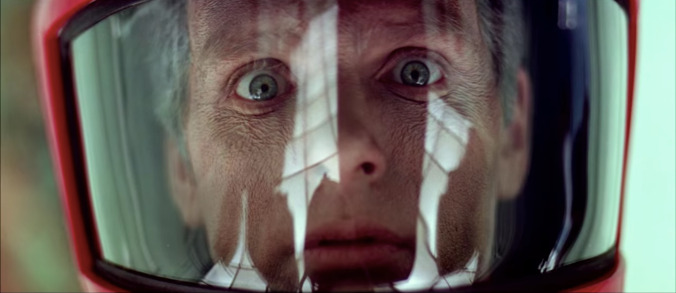Listen to Stanley Kubrick explain the ending of 2001: A Space Odyssey, if you dare
Aux Features Stanley KubrickFew artists are interested in articulating the meanings of their works. To paraphrase David Lynch, many ideas manifest onscreen because they couldn’t be articulated in words. Still, that hasn’t stopped the masses from hounding the likes of Lynch for clear-cut explanations, an experience to which enigmatic filmmaker Stanley Kubrick was also routinely subjected. What’s different in the above clip, which has recently been making the rounds on Reddit, is that Kubrick actually provides a fairly straightforward answer when asked to unpack the ending of 2001: A Space Odyssey, which features one of the most striking, thought-provoking climaxes in film.
First, a little background about the interview. Filmed during post-production on Kubrick’s The Shining, the footage is thought to be part of a Japanese paranormal documentary hosted by Jun’ichi Yaio, a TV personality who, it’s been said, is credited with popularizing the concept of UFOs in Japan. He was intrigued by the The Shining due to reports of paranormal activity on the set.
The documentary never aired, but the footage came from original production master VHS tapes in the personal collection of Wendelle C. Stevens, a ufologist who was reportedly part of the production. iO9 reports that a VHS of the raw footage was sold on eBay in 2016, which is how it ended up online (just in time for its 50th anniversary).
Yaio was granted a phone interview with Kubrick for the documentary, during which he asked a number of hilarious questions, including whether or not Kubrick had any supernatural powers of his own. In discussing UFOs (Kubrick says their existence is “almost impossible to believe, and yet at the same time some of the sightings are so extraordinary”), Yaio asks him to explain the ending of 2001.
Here’s Kubrick’s full response, though do note that, as so many artists (including Kubrick) have pointed out previously, learning an artist’s true intentions is often underwhelming and can spoil your own interpretation.
Anyways:
I’ve tried to avoid doing this ever since the picture came out. When you just say the ideas they sound foolish, whereas if they’re dramatized one feels it, but I’ll try.
The idea was supposed to be that he is taken in by god-like entities, creatures of pure energy and intelligence with no shape or form. They put him in what I suppose you could describe as a human zoo to study him, and his whole life passes from that point on in that room. And he has no sense of time. It just seems to happen as it does in the film.
They choose this room, which is a very inaccurate replica of French architecture (deliberately so, inaccurate) because one was suggesting that they had some idea of something that he might think was pretty, but wasn’t quite sure. Just as we’re not quite sure what do in zoos with animals to try to give them what we think is their natural environment.
Anyway, when they get finished with him, as happens in so many myths of all cultures in the world, he is transformed into some kind of super being and sent back to Earth, transformed and made into some sort of superman. We have to only guess what happens when he goes back. It is the pattern of a great deal of mythology, and that is what we were trying to suggest.
As iO9 notes, Kubrick’s explanation is, in many ways, in line with what happens in Arthur C. Clarke’s novel, which was developed concurrently with the film.
You can watch the full stream of unedited footage below, which includes interviews with Vivian Kubrick and Julian Senior, who, at the time, was the Vice President of Advertising & Publicity for Warner Brothers/ Europe.
